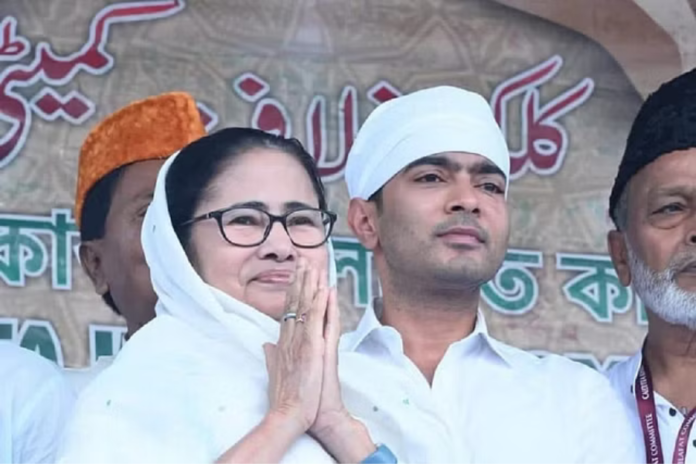‘Entrepreneurship loans’ of up to Rs. 5 lahks have been made available by West Bengal Chief Minister Mamata Banerjee to persons who have fled the Nuh district of Haryana as a result of recent violence there.
Attacks against Hindu religious processions served as the catalyst for the unrest in Muslim-dominated Nuh. Many Bengali Muslim migrants who had left West Bengal to work as housekeepers, construction workers, ragpickers, and daily wage earners were forced to return from Nuh because of the violence.
TMC delegation visits Nuh
According to reports, 150 Muslim migrant workers and their families from the Bengali districts of Malda, Murshidabad, North and South Dinajpur, and Birbhum have left Nuh for Bengal.
‘Entrepreneurship loans’ would be made available by the state government, according to the chief minister’s announcement made on Monday, August 21. This will assist those who have returned from Nuh in starting their own enterprises in West Bengal.
According to Banerjee, this was done for the sake of “our Muslim brothers and sisters” and was also a humanitarian act. She was speaking Monday in Kolkata to a gathering of imams and muezzins (the men who summon Muslims to prayer from mosques).
Banerjee despatched a delegation to Nuh, led by Trinamool Rajya Sabha MP Samirul Islam, to get firsthand information about the unrest there.
Islam reportedly assured Muslim community leaders in Nuh—a notoriously violent district known as a haven for gangsters and criminals—that the Trinamool Congress will always support them.
Samirul Islam is a college professor and the director of a civil society organisation. He was nominated to the Rajya Sabha last month. The Chief Minister received his field report on Nuh last week.
The loans would be made available through the West Bengal Bhabishyat Credit Card Scheme (WBBCCS), according to state officials. The state government backs loans under this programme with an 85% loan guarantee and a 15% money guarantee.
The loan has a very low interest rate and is soft and subsidised for small business owners.
No need to leave Bengal
Those who have returned from Nuh won’t need to go there or to any other state, according to the West Bengal Chief Minister, to hunt for work.
They may start their own enterprises and prosper in West Bengal alone, according to Banerjee.
Banerjee had previously stated that folks who leave West Bengal in quest of employment won’t have to do so any more.
She had promised that everyone would find employment in the state after thousands of migrants from Bengal had returned to the state during the Covid 19 pandemic.
The state government had also established a system for registering the immigrants and assisting them in finding employment there. However, nothing came of it because there aren’t any jobs available.
Following the June 2 railway catastrophe in Odisha’s Balasore area that claimed 294 lives, many of them from West Bengal, Mamata Banerjee had also made a comparable assertion.
The majority of those killed in that catastrophe were migrant workers from West Bengal who were heading to other states in quest of employment. At the time, Banerjee had also stated that a large number of employment prospects were emerging in West Bengal, eliminating the need for individuals to leave the state.
Banerjee touted the state’s upcoming three economic corridors as well as a new coal mining project that she said would create thousands of jobs.
“Stay back in Bengal and take advantage of the many opportunities opening up. No one needs to go out. Stay in Bengal and be safe and prosper,” said Banerjee.
However, the chief minister’s claim is negated by the reality that thousands of young men and women leave Wes Bengal in pursuit of work, whether they be manual, semi-skilled, or skilled, or white, blue, or brown collar.
Loan for Muslims from Nuh
The offer of loans by Mamata Banerjee to the Nuh returnees is problematic for three reasons, though we’ll get back to them later.
One, because all of the Nuh returnees are Muslims, it appears that a loan offer was made. If those returnees had not been Muslims, Mamata Banerjee would not have been as kind to them.
Two, many Muslims who have escaped Nuh may not be citizens. Numerous claims have been made that many of the Muslims in Nuh are illegal Bangladeshi immigrants and Rohingyas.
Such claims have been made by Haryana state officials as well, and the Haryana Police recently detained 17 Rohingyas who were travelling to Nuh from Bengal (also see this report on Rohingyas in Nuh).
As a result, before receiving any form of preferential treatment, all Nuh returnees must be subjected to a thorough background check that includes a detailed examination of their documentation and antecedents.
Three, the Nuh refugees should not receive any particular consideration. Each of them left Nuh on their own and is not a victim of violence. The fact that none of them will find food in Bengal ensures that they will all return to Nuh once more.
Anyone who can persuade lending organisations that they have a solid business plan may be eligible for an entrepreneurial loan. Such loans ought to be granted solely based on merit.
The Nuh returnees should have been informed that they can apply for loans through the proper channels and will need to meet the established requirements in order to acquire loans if they wish to launch small companies on their own.
Appeasement measures should not be funded by the tax payers; this is poor governance. It is safe to conclude that the chances of the loans offered to the returnees ever being repaid are quite minimal.
The loans will subsequently become subprime loans that must be wiped off.
All of this, however, doesn’t seem to matter much to Mamata Banerjee, who consistently puts her own personal political interests ahead of that of the public coffers.



